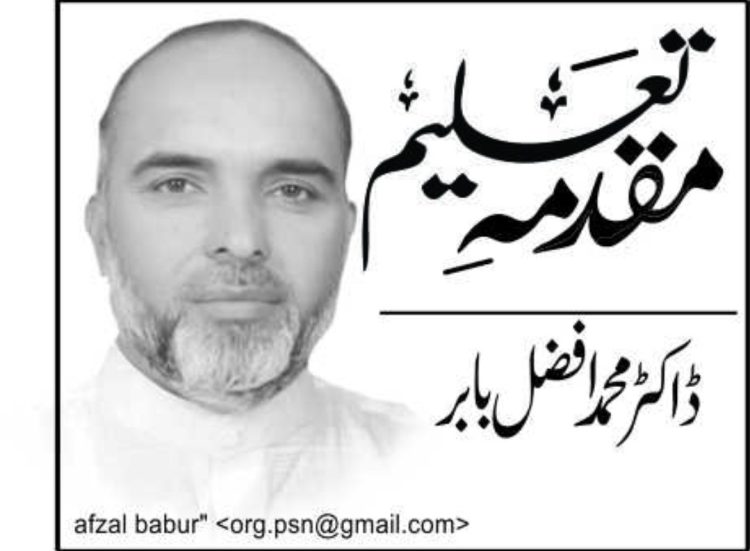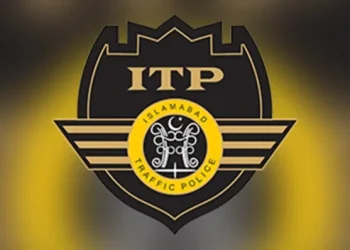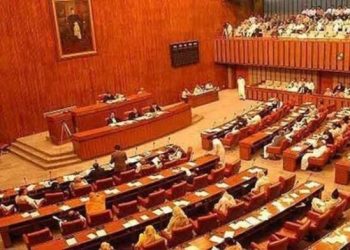By Dr. Muhammaf Afzal Babar
A few days ago, I had the opportunity to attend a national-level education seminar in which Federal Minister for Education Dr. Khalid Maqbool Siddiqui and Provincial Minister for Education Ms. Raheela Hameed Khan Durrani and other education experts were present on the stage. The sentence with which the JICA representative in Pakistan began her speech was a moment of reflection for all of us Pakistanis. She said that in 1945, the Second World War destroyed Japan and in 1947, Pakistan came into existence. Today, where does Japan stand in the field of education and where does Pakistan stand? These words are apparently very few, but if you think about it, they contain a big lesson. On December 3, 2018, the United Nations General Assembly unanimously passed a resolution declaring January 24 as the “World Education Day” with the theme of the role of education for peace and development. UNESCO, as a subsidiary body of the United Nations for Education, facilitates the celebration of this day annually in collaboration with important figures from the United Nations Department.
The first World Education Day was celebrated on 24 January 2019. On World Education Day, the United Nations Educational, Scientific and Cultural Organization (UNESCO) is highlighting the fundamental role of teachers in preventing the spread of hate speech around the world. On this day, UNESCO has said that education is of particular importance in combating narratives that incite prejudice, discrimination and violence.
On World Education Day, UNESCO Director-General Audrey Azoulay has clarified in her statement that there is an urgent need to make education a priority tool for promoting human dignity and the values of peace. If hatred begins with words, peace begins with education. What a person learns changes his perspective on the world and education determines how we behave towards others.
The theme of International Education Day 2025 is “AI and Education: Preserving Human Agency in a World of Automation.”
“Artificial Intelligence and Education: Challenges and Opportunities” This theme focuses on the importance of education to equip people with skills and knowledge. The use of artificial intelligence in the field of education is a topic that is currently being discussed all over the world. Based on artificial intelligence, such digital programs can be designed through which a student’s educational ability, skills, speed of knowledge acquisition, achievement of goals, etc. can be ensured.
A system based on artificial intelligence can solve the problems of students even without a teacher. It has the ability to respond immediately. Educational institutions are using AI skills for content development, curriculum design, online learning platforms and administrative tasks. A recent UNESCO report revealed that the number of children in school has increased by 40 million in the past nine years, but this growth is not uniform everywhere and there is a big difference in this regard between rich and poor countries. Rich countries spend an average of $8,543 on education per child each year, while governments in middle-income countries spend an average of $55 per child. The report said that the increase in the number of children in school has not been satisfactory since the United Nations declared the right to education essential for sustainable development in 2015. In low-income countries, 33 percent of children and adolescents of school-going age are out of school, while in high-income countries the rate is 3 percent. Another UNESCO report states that lack of government investment in education is the reason why children are out of school.
Countries that are burdened with debt are in even worse shape.
UNESCO is calling on the G20 leaders, with the support of Brazil, to develop a specific financing mechanism for promoting education, including providing loans to countries for educational development. Our world is at a unique juncture in history that is changing at an unprecedented pace. The effects of changing social, environmental and technological trends are changing the education system. Artificial intelligence has revolutionized every sector around the world, especially in the education sector. AI has opened new doors for development around the world. No country can develop without scientific and technical knowledge.
There are both advantages and disadvantages to using artificial intelligence. It is up to the user to use it positively or negatively. Teachers can also benefit from artificial intelligence. It is very important to equip teachers with artificial intelligence and the skills to use it. The invention of educational robots has surprised everyone. These robots answer any question immediately. In Pakistan, a friendly AI teacher created with artificial intelligence, who is an expert in all subjects, has been introduced in a private educational institution. She is called “Miss Aini”. Miss Aini is a robotic teacher created with the help of artificial intelligence. She answers the questions of the students in a timely manner and teaches almost all subjects with great skill.
Miss Aini is the first AI teacher in Pakistan who teaches students from Montessori to Matriculation in a private school in Karachi. The children have also been better impressed by Miss Aini and their interest in studying has increased further. If such AI teachers are introduced in government schools too, it can help in improving the quality of education and solving other problems faced. According to the students, robotic classes are


















